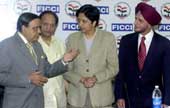 |
| The final frontier: Indra Nooyi (centre), the new president and CEO of Pepsico Inc., attends a business meet in New Delhi |
Whichever way you look at the corporate world, women aren’t on top. It is getting better: 10.5 per cent of directorships of FTSE 100 companies were female-held in 2005, compared with just 5.8 per cent in 2000, according to research by Cranfield University School of Management. But women are hardly swamping the boardroom.
This puts the number of highly successful women in a tiny minority. Say “powerful woman” and the following career path springs to mind: rose through a male-dominated work environment; was toughened by years of struggling against discrimination and glass ceilings; fought her way to the top harder than her male counterparts, forced herself to be aggressive and pushy. Look at Margaret Thatcher.
But is this an accurate picture? Do women have to be hard-nosed and aggressive, characteristics stereotypically associated with men, to get on in a male-dominated working world?
Some evidence points to this being the case. Jonathan Perks, the managing director of Penna Leadership Services, says, “There’s an interesting tension going on. There’s a drive for organisations to become more feminine and emotionally intelligent. On the other hand, not a lot has changed: there are still the hierarchies, the old reward systems.” He quotes research that suggests that more aggressive women leaders “dumb down” their more “feminine” characteristics — social responsibility and interpersonal skills — more than most average male leaders.
But are these bullish women different from men at the same levels? Doesn’t their behaviour come across as repugnant simply because we wouldn’t expect it of a woman, although if a man displays the same characteristics it’s seen as fine? “I take issue with certain characteristics being considered male or female,” says Kate Bulkley, a freelance journalist who specialises in media and technology. “Why is a woman not allowed to be driven? Why is that a male role? Think of a single mother trying to feed her family — she’s passionate and driven.” It’s not just business that perceives certain traits as male or female; it’s all of society. “On TV you have an older male presenter and almost always a younger female presenter. Why? Because that’s the way our society tells us it’s good.” Bulkley thinks that it’s starting to change, “Kate Adie is a senior broadcast journalist because she’s smart. But we’ve got a while before that gets through the system.”
Until society changes, women are still faced with a male-dominated corporate world, at least in the traditional business sectors such as finance. “The old professions, such as banking, were made for men by men with men in mind,” points out Irene Dorner, a general manager at HSBC. She argues that the quickest way for women to progress is to learn to play the men’s game, which is why women aren’t yet flooding into senior roles: most throw in the towel early because it’s a constant drain on their energy to fit in. “The ones who have got to the top have either learnt to play the game better than the men, or were made like that in the first place.” She says that they have burnt the bridges for women coming after by fitting in to the men’s game. “Women need to be better role models.”
But for the women who do make it to the top, the struggle to get there hasn’t done them any harm. It seems to work, and even to make them better leaders. Louella Eastman, the group diversity director at Aviva, the insurance group, feels comfortable as a woman in her role.
But it’s not always been like that for her. She started out as a foreman and admits that she was “a bit of a novelty”. She also recalls stopping an interview for an industrial relations position because she felt that her interviewer wasn’t taking her seriously. She got the job. “It helps having had those experiences,” she says, because you come to know yourself better, and the trustworthy, honest and most authentic leaders are the most effective ones, male or female.










